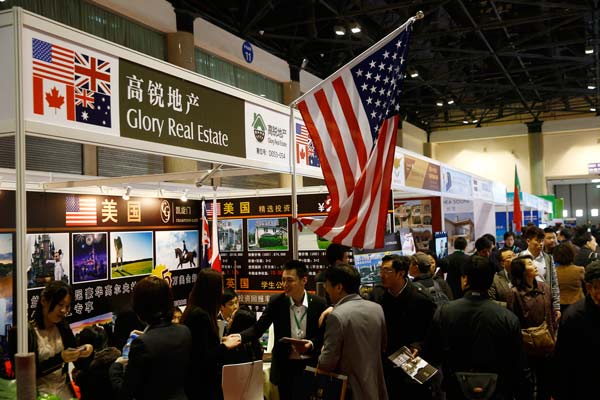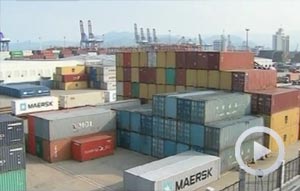Looking abroad for better investment
Updated: 2013-07-01 02:54
By HE WEI in Shanghai (China Daily)
|
|||||||||
|
 |
|
An international real estate fair in Beijing, focusing on emigration to developed nations via property purchase, proved to be attractive to many Chinese. Provided to China Daily |
Chinese interests
Jeff Carmichael, a certified public accountant at RockBridge Senior Living Group LLC, a management advisory and consulting services provider, believes the EB-5 has only become a main alternative source of capital in the last three years because of the economic slowdown and banking system restrictions on capital.
The time slot happened to coincide with a noticeable wave of Chinese interest in the projects, when he noticed 3,600 investor visas — 80 percent of overall visas — were issued to Chinese nationals in the last US federal fiscal year that ended June 30, 2012.
"My observation is that around 85 percent of participants who take advantage of the EB-5 are from China. I guess it is because of the more-than-ever allocation of wealth in Chinese society and the appreciation of the renminbi," said Reiff, whose office in Shanghai has been handling applications on a daily basis.
In light of the relaxed requirements, the EB-5 project has become non-exclusive to rich Chinese entrepreneurs, said Grace Zhu, a consultant with UDA Education Consulting Group, an investment immigration service provider in Shanghai.
"Many high-profile white-collar workers and executives of companies are among the main applicants of the program. So long as they have more than 3 million yuan ($489,021), they become eligible candidates," Zhu said.
However Shen Wei, general manager of Hengxin Immigration Co Ltd, believes things are much easier for the wealthier. He depicted a typical applicant as someone who runs an enterprise and owns several residential apartments in China's first-tier cities.
"My estimate is that their net assets are worth at least 15 million yuan. They can simply invest without worrying about the deposit," he said.
The EB-5 has gained so much traction in China that Shen's firm has received 400 potential customers after a three-day overseas investment fair in Beijing.
He referred to a client, 58, who runs an iron ore plant in Inner Mongolia autonomous region. He is applying for his 28-year-old son to live in the US so he can have a better education and welfare resources.
Zhu said people aged 40 to 45 make up the majority of the applicants — and most of them come from the well-off coastal provinces such as Zhejiang and Guangdong.
"They are driven by living conditions in the US, the education resources and the welfare system. For some very ambitious entrepreneurs, they also look at overseas market expansion," she said.
Chinese preferences toward real estate are also found at the top of their overseas investment portfolios, experts say.
"It seems to me the Chinese are more interested in attaining real estate or options to have real estate in the US," Reiff said, saying that owning property can enable them and/or their families to move to the US in the future.
The majority of Reiff 's clients are looking at hotels, housing programs and any kind of assisted-living projects such nursing and old people's care homes. Furthermore, the Chinese favor recognized brands.
"For example, if a residential project is associated with world-renowned brands such as Marriot or Hyatt, people feel more comfortable about pouring their money into it," she said.

 Joey Chestnut wins 7th contest with 69 dogs
Joey Chestnut wins 7th contest with 69 dogs
 Lisicki, Bartoli to vie for new Wimbledon crown
Lisicki, Bartoli to vie for new Wimbledon crown
 Muscle Beach Independence Day
Muscle Beach Independence Day
 Tough workout for Li Na in war of words
Tough workout for Li Na in war of words
 Submersible taps mineral deposits in S China Sea
Submersible taps mineral deposits in S China Sea
 Ecuador finds spy mic for Assange meeting
Ecuador finds spy mic for Assange meeting
 US martial artists arrive at Shaolin Temple
US martial artists arrive at Shaolin Temple
 July 4 in Prescott: Balance of grief, patriotism
July 4 in Prescott: Balance of grief, patriotism
Most Viewed
Editor's Picks

|

|

|

|

|

|
Today's Top News
Baby formula price probe to shake or reshape industry?
Passenger detained over bomb hoax in NE China
High rent to bite foreign firms in China
Egypt's prosecution imposes travel ban on Morsi
Russia more impatient over Snowden's stay
Mandela still 'critical but stable'
Figures show shifts in US, China economies
Chinese electrician killed in Cambodia
US Weekly

|

|







